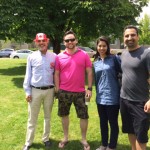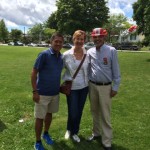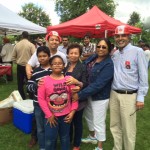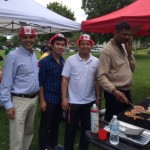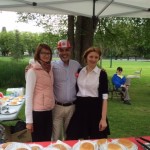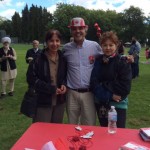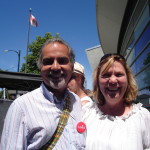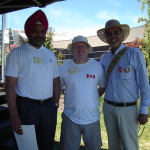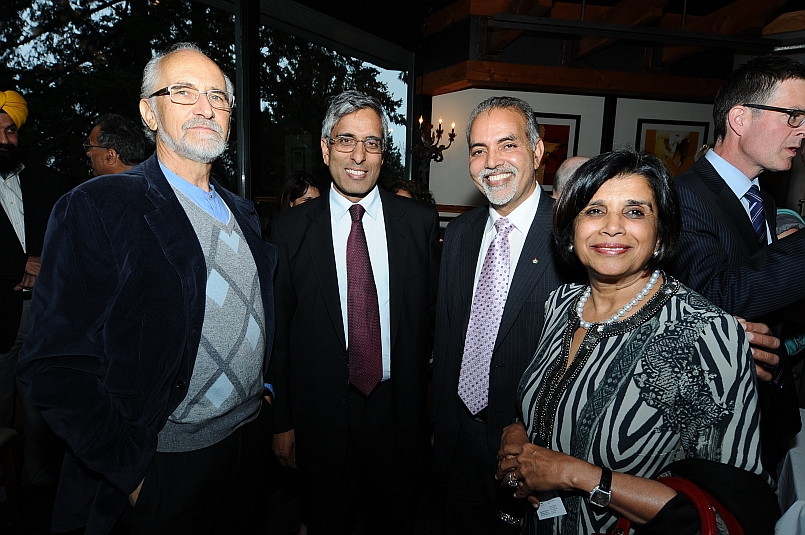Tackling Surrey Crime
Op-ed originally published in The Vancouver Sun on July 6, 2018 and in The South Asian Post on July 3, 2018.
Surrey has Canada’s third-worst crime problem after Grande Prairie and Red Deer, according to Statistics Canada. The Combined Forces Special Enforcement Unit says there are over 180 established criminal gangs in B.C. The RCMP’s 2015 annual report on organized crime ranked the Indo-Canadian groups third after bikers and Asian gangs for their strength and sophistication in B.C.’s hierarchy of criminal organizations.
Why is Surrey now the epicentre of gang activity and gun violence? Is it due to inadequate policing and community outreach programs for at-risk youth? Is glorification of a gangster lifestyle in certain demographic groups a factor? Are the gaming, music and movie industries a contributing factor by creating a fascination amongst youth with the gang life? Are high housing costs and poverty possible causes? Or is it Surrey’s geographic location and size coupled with a young, growing and diverse population making the drug trade more bankable for gangs?
Answers to such questions can aid in determining a new community based long term multi-pronged action plan to combat this complex and troubling issue.
The presence of well-established and powerful gangs like Hells Angels, Red Scorpions and the United Nations Gang, along with new low-level dealers from different socio-economic backgrounds, has become a huge public safety challenge as rival gangs fight over turf. Surrey may simply be the current battleground. Retaliation-driven violence often kills targeted younger members and, sadly, innocent people.
Surrey residents are fearful, angry, and frustrated. Thousands grieved together at the recent Wake Up, Surrey rally after the murder of two teenagers. They are calling on politicians and law-enforcement agencies to fix the problem, including demands for more police officers.
Surrey has one officer per 675 residents. Vancouver has one per 505 people; there is one Delta cop per 593 people while Abbotsford has one officer per 655 people. Based on this simple comparison, Surrey could use another 250 police officers immediately and 18 to 20 more per year with the projected annual population growth.
But police strength is only one part of a complex system of resources, deployment, strategies and tactics.
Community rallies are cathartic and help to comfort and unite the residents but rallies and more officers will not address the underlying causes. We need to ask why the drug business so lucrative in B.C.
Gurdwaras, churches, temples, mosques and other community organizations share the responsibility of keeping youth out of gangs. Police departments run excellent crime prevention, youth sports and outreach programs. But more innovative approaches to support families and youth are needed. Prevention and intervention will help keep youth out of gangs while the criminal justice system continues to disrupt gang networks.
It is interesting to note that even with the current wave of murders in Surrey, the homicide rate for Metro Vancouver is at a 20-year low at 1.88 murders per 100,000 people. Violent-crime rates are also at historic lows. Of the over 250 unsolved murders in the region, more than two-thirds are gang and drug related which are inherently difficult to solve quickly. The overall youth crime rate and its severity have declined in the past decade, while violent crimes committed by young people have increased in severity.
On balance, our police seem to be doing an effective job in keeping us safe. Can they do more? Yes. But so can we as a community!
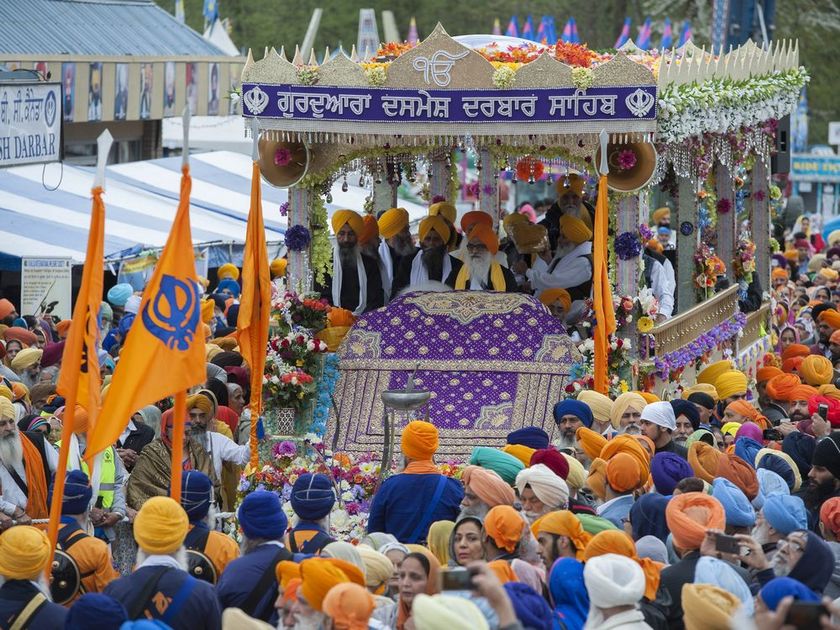
It’s time to celebrate Vaisakhi
Op-ed originally published in The Vancouver Sun on April 12, 2018. Photograph by: Jason Payne
Dust is slowly settling on Prime Minister Justin Trudeau’s turbulent trip to India and the diplomatic fallout from convicted terrorist Jaspal Atwal’s presence in India with the Trudeaus. Federal NDP leader Jagmeet Singh has finally condemned use of political violence and “all acts of terrorism in every part of the world”.
But Canadians are left with the impression of widespread Sikh support in Canada for an independent Sikh homeland carved out of India. A very small Sikh group known as “Khalistanis” use Canadian politicians and institutions to further this goal. Meanwhile, India accuses our politicians of giving tacit approval to this cadre with its tentacles into Canada’s political parties, particularly the federal Liberal party. Jagmeet Singh’s stated objective to pass a motion in parliament declaring the 1984 anti-Sikh violence in India a “genocide” is casting a dark cloud over Canada-India relations and risks fracturing the Indo-Canadian community.
With the upcoming Vaisakhi parades in Vancouver, Surrey and Toronto, Canadians might be wondering about the real intent behind the parades. Which politicians will be courting temple leaders and factions within the vote-rich Punjabi Sikh community? Undoubtedly, many politicians may be reluctant to attend the parades for fear of being photographed with questionable individuals who display admiration for the Air India bomber Talwinder Singh Parmar and others who inspired the violent struggle for Khalistan.
Let’s clear the air for an open dialogue: Sikhs are not terrorists. The majority of them do not want a separate homeland.
Five centuries ago, Guru Nanak, founder of Sikhism, spoke against tyranny and oppression. Courageously, he described the politics of his time “as like drawn knives, kings like butchers. Righteousness has fled on wings. The dark night of falsehood prevails, and the moon of truth is nowhere visible.” All of the 10 Sikh gurus were subversive and social entrepreneurs. They championed the ideas of one God, diversity and inclusion. They called upon all to live truthful lives marked by honest work and sharing with others in need.
“Langar” (a communal kitchen and common meal) was introduced by Guru Nanak to break down caste, creed, colour and social status barriers, and to unite people as equals. Hungry people today eat in Sikh temples from Amritsar to Abbotsford, Birmingham to Brampton, and New Delhi to New York. Sikh belief in the oneness of God and the oneness of humanity threatens power structures, whether built upon the caste system in India or on ethnic, language, race and religious superiority elsewhere.
It is important for Canadians to understand the meaning of Vaisakhi. It is a centuries-old harvest festival celebrated yearly in April bringing diverse people together. Vaisakhi became significant for the Sikhs in 1699 when the tenth guru, Gobind Singh (1666-1708), baptized five men and was himself baptized by them creating the “Khalsa” (community of the pure). The five outward symbols of the Khalsa identity represent inner strength and commitment to truthful living.
Vancouver and Surrey Vaisakhi processions are amongst the largest and most colourful in the world. All Canadians are welcome to join and enjoy Langar (free food) along the parade routes. Like Thanksgiving Day, Vaisakhi includes charity, praying for prosperity for all, and gratitude for the harvest. Sikhs wish to celebrate Vaisakhi by focusing more on the core values of inclusion, equality, community service, and harmony, and less on the political agendas of the politicians and narrow-minded groups within the Sikh community.
We may never know to what degree Trudeau’s trip has affected Canada-India relations. But we do know Sikhs are an integral part of India as they are of Canada. Canadian politicians should continue to participate in Vaisakhi celebrations, affirm the territorial unity of India, and denounce promotion of all political violence by anyone. They should also avoid the cultural appropriation of the Sikh turban, as it is not a fashion accessory or part of a costume. It is a sacred expression of faith and identity.
Happy Vaisakhi, Canada!
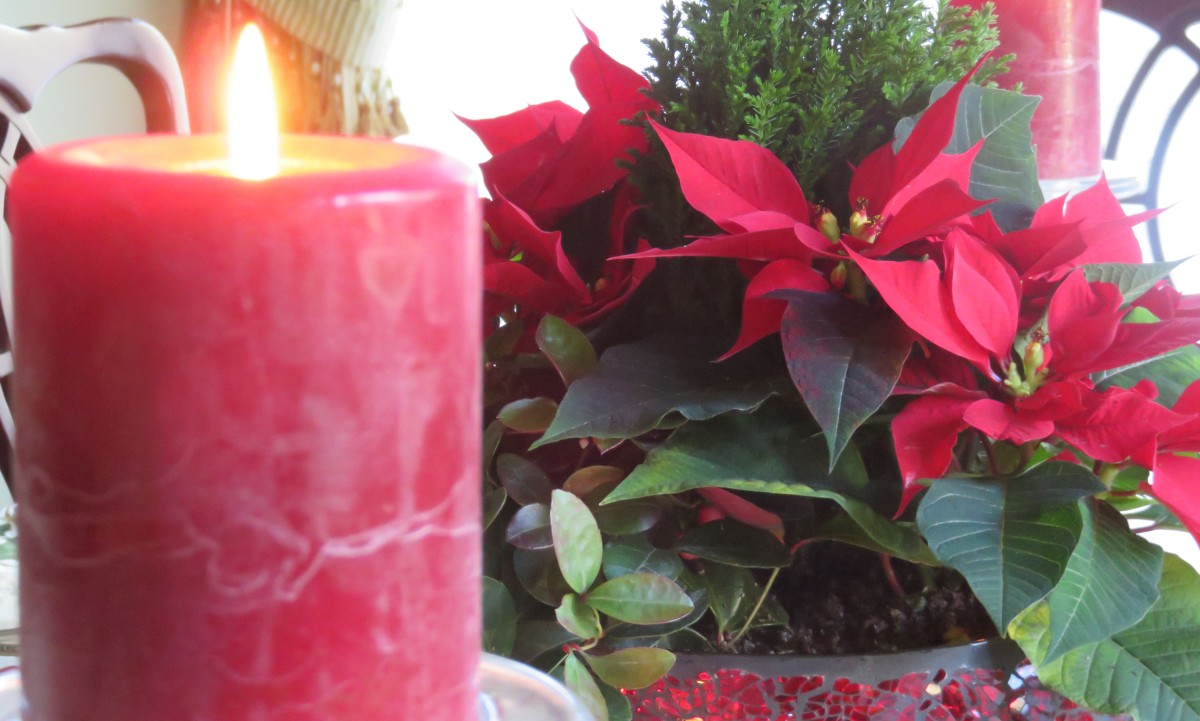
Merry Christmas 2015!
Reflections for the Holiday Season
Today many Syrian refugees are celebrating Christmas in Canada and perhaps their first safe and peaceful Christmas in many years but without all their loved ones. I can only imagine their joy mingled with loss and sadness.
Sixty seven years ago in 1948, my mother-in-law’s family celebrated its first Christmas in Canada in a wooden shed warmed by fire from a stove on a farm in Langley, BC. They were a displaced family without her father who had been taken away by the Soviet communists. They were among the lucky German Mennonite refugees from Ukraine sponsored to Canada by the Mennonite Central Committee with the help of a distant relative. My mother-in-law has a vivid memory of that first Christmas. She says, “There were a few feet of snow outside. The ship lap boards on the exterior walls of the shed had gaps in them. It was cold but we felt warm and grateful. For the first time in my life we were free and safe to sing songs of joy and peace. We were sad to not have my father with us. Many other Mennonite families also had lost loved ones including children and their fathers, uncles and grandfathers. We were excited to open our presents which we had ordered from the Eaton’s catalogue. Canada has been wonderful to us.”
As a young married couple with their newly born first child, my father and mother lived through pain, suffering and death of millions in Punjab during the 1947 division of Pakistan and India. It was the largest forced migration in history with horrific violence and destruction with some great feats of kindness and sacrifice. My father risked his life protecting Punjabi Muslims fleeing to Pakistan while helping to settle displaced Punjabi Sikhs in the Indian side of Punjab.
Jesus with his parents, Joseph and Mary, were displaced persons as well. According to the Gospel of Matthew, God appeared to Joseph in a dream, “Get up, take the child and his mother and escape to Egypt. Stay there until I tell you, for Herod is going to search for the child to kill him.” Afraid of the ancient Jewish prophecies about a saviour being born in Bethlehem, King Herod, the proxy ruler for the occupying Romans in Judea, sent his troops to kill all the boys two years of age and under born in and around the vicinity of Bethlehem. Jesus and his family returned to their homeland after Herod had died.
Jesus lived a simple life of compassion towards others. He crossed boundaries and challenged prevailing social norms. He healed the sick, mended broken hearts, and, proclaimed justice and peace. He forgave those who nailed him to the cross. This Christmas let us celebrate our common humanity and seek to renew existing relationships and build new ones across boundaries upon compassion and not on commerce and power.
Merry Christmas!
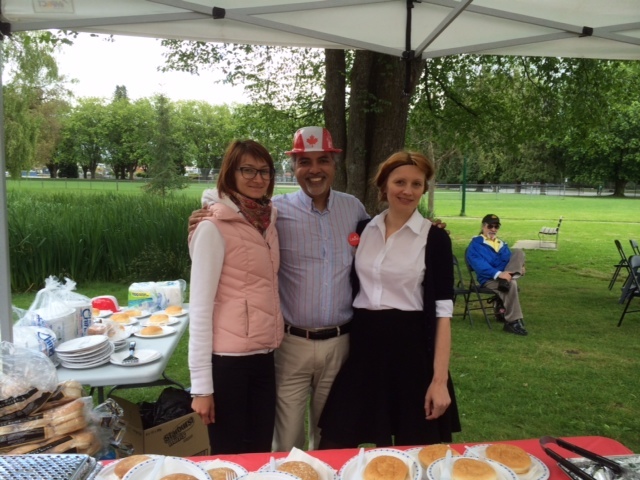
Celebrating Summer in Vancouver South
On Sunday, June 29, we hosted a wonderful community summer barbecue and picnic at Memorial South Park.
Over three hundred enthusiastic friends, supporters and volunteers, mostly from Vancouver South, joined us for good conversations and great food. Some of us reminisced about our high school days at John Oliver. Lots of laughter and fun!
Thanks to everyone for making it a great day!
- Barj with Gavin, Harmon and Ajay
- Barj with Jojo and Isa Solacito
- Barj with Edel and his children and Ching and Nellie
- Barj with Robert, Edel and Gurjit
- Barj with volunteers
- Michael Lam, Raj Sidhu and Barj
- Barj to his right with Nellie Vandt, Celyna Sia Sherest and friends
- Barj with Jaswinder Sandhu and Anna Funk
- Barj with Victor and Dora Kliewer and Kuljinder Shoker

Celebrating Canada
Celebrating Canada Day at Sunset Community Centre.
There is no other city like Vancouver, and absolutely no other country like Canada. I’m proud to be Canadian!
And what a Canada Day celebration it was at Sunset Community Centre this year! Wonderfully hot and everyone happy, it was a great turnout with fun-filled activities for all.
There were lots of kids running around with our flag painted on their faces, while other enjoyed delicious food at the community centre. Thank you to the organizers for putting on the party. Happy Canada Day!
- Celebrating Canada Day
- Barj with the architect working on the Sunset Community Concept Master Plan
- Barj with Patty Sahota (former BC MLA) and her niece
- Barj with Jennifer and Doug Clarke, and Manjit Thandi
- Barj with Bhalwinder and Mark, both directors with the Sunset Community Centre Association


